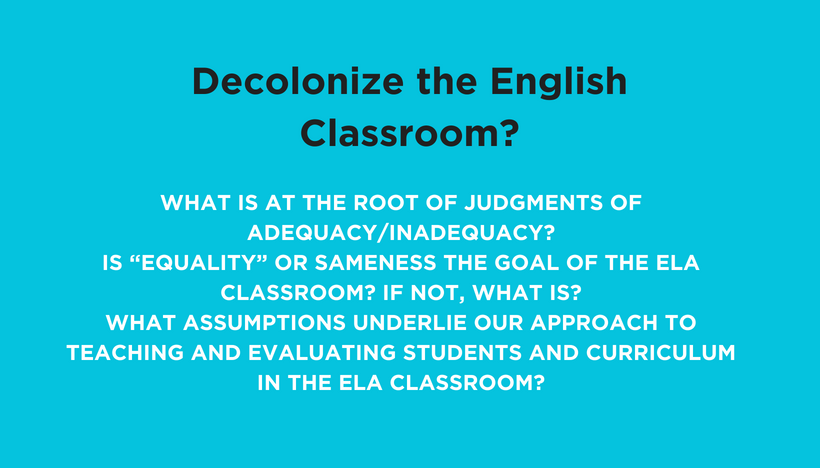The following post was written by Vivian Yenika-Agbaw, The Pennsylvania State University, University Park, Kevin DePew, Old Dominion University, Norfolk, VA, Kylowna Moton, LA City College, CA, Michael Seward, Minneapolis Community and Technical College. This post is part of an ongoing series from the NCTE Standing Committee on Global Citizenship.
In one of our earlier entries for the citizenship campaign last year, Nicole Mirra opens with a statement from the NCTE’s Standards for the English Language Arts publication on the meaning of democracy. We repost that statement here to introduce our topic for this month of June:
“In a democracy, free and universal schooling is meant to prepare all students to become literate adults capable of critical thinking, listening, and reading, and skilled in speaking and writing. Failure to prepare our students for these tasks undermines not only our nation’s vision of public education, but our democratic ideal.”
We follow this with an argument that democracy as explained here would be more effective only if the curriculum is decolonized!
Decolonization
Eminent postcolonial and decolonial theorists, Ashcroft, Griffith, and Tiffin posit that “Decolonization is the process of revealing and dismantling colonialist power in all its forms. . . . dismantling the hidden aspects of those institutional and cultural forces that had maintained the colonialist power and that remain even after political independence is achieved” (56). One major example of such hidden aspects revolves around the colonial ideology that continues to inform the western education system.
If we are to decolonize the English curriculum and classroom, we are obliged to examine the perspective from which we view our students and, more importantly, the way we contextualize them and teach them to contextualize themselves. We must begin by developing an alternative to the colonial gaze with its practice of “othering” and its assumption of native (non-European descendent cultures) brokenness. As long as we hold up the norms of the dominant social group in America (and nothing else) as the standard to which everyone should aspire in order to be deemed adequate, we will perpetuate a system that rewards middle-class white attitudes and behaviors and renders all others inferior, broken, and inadequate.
Expectations of Educators
We are aware of the fact that it is the basic expectation of educators to facilitate learning for all children. For English teachers, this task can be onerous. We are expected to help students read, write, create, and think critically; however, the cultural space, the classroom space, where school Englishes are experienced and how they are experienced, may limit students’ ability to self-actualize—one reason being the very nature of the curriculum can make it antithetical to social justice goals.
Thus, the ideal of making the classroom a space for all students to succeed cannot be achieved under the current educational systems and culture that privilege white, western epistemologies. This raises the issue of citizenry and citizenship.
If “[c]itizenship connotes belonging, which takes several forms, two of which are the language of instruction and the kinds of literacy practices curricular materials allow for” as Yenika-Agbaw postulates (383), then why is it that we cannot rethink our ELA curricula to allow for belonging that takes into consideration multiple histories and realities?
The English language continues to serve as an emancipatory tool for students in that it creates better opportunities for those who successfully navigate the system to participate in local and global economies, but it also continues to serve as an exclusionary tool for those unable to access that same system with its brand of English successfully.
Decolonize the English Classroom?
We must ask ourselves some questions if we are to consider the factors that mark the English classroom as a colonized space and how we can change them:
- What is at the root of judgments of adequacy/inadequacy?
- Is “equality” or sameness the goal of the ELA classroom? If not, what is?
- What assumptions underlie our approach to teaching and evaluating students and curriculum in the ELA classroom?
Don’t Miss Our Convention Workshop
At the upcoming 2018 NCTE Annual Convention in Houston, we plan to address these issues in substantial detail during our workshop, “W.04 Decolonizing the English Classroom: What Can You Do?”
We will also provide practical steps to consider taking in English classrooms and institutions to decrease the impact of colonization on students, as well as a theoretical framework for understanding and resisting the forces of colonization inherent in our educational system.
So, please join us on Thursday, November 15, 2018 in Houston, from 11:30 am to 3:30 pm!
Meanwhile, why not start by checking out the following resources?
Cambridge academics seek to “decolonise” English syllabus, Maev Kennedy, 25 Oct. 2017
Why is My Curriculum White? Michael Peters, Educational Philosophy and Theory, 2015, Vol. 47, No. 7, 641–646.
Why is my curriculum white? 9 Dec. 2014, Dismantling the Master’s House, University College, London [Video].
Literature and Literacy: Rethinking English as a School Subject. Robert Yagelski, English Journal, vol. 83, no. 3, March 1994, 30–36.
References
Ashcroft, Bill, Gareth Griffiths, and Helen Tiffin. (2000). Post-Colonial Studies: The Key Concepts. 2nd ed., Routledge.
Yenika-Agbaw, Vivian. “Textbook, Literacy, and Citizenship: The Case of Anglophone Cameroon.” Research in the Teaching of English, vol. 50, no. 4, May 2016, 378–399.

